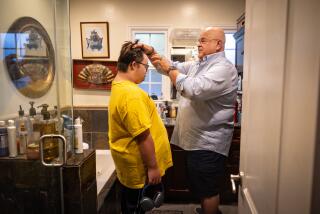Pioneering UCSD Center to Study AIDS’ Effect on Brain
- Share via
A unique new center for the study of how AIDS affects the brain and central nervous system has been established at UC San Diego and may offer the most comprehensive look yet at the neurological, psychological and behavioral effects of the disease, medical authorities say.
Financed by a $19.5-million, five-year grant from the National Institute of Mental Health, the HIV Neurobehavioral Research Center will be staffed by researchers and physicians from UCSD, the San Diego Navy hospital and the San Diego Veterans Administration Medical Center.
“Up until now, the study of central nervous system involvement of HIV has been something of a patchwork, with some people looking at neurology, others looking at psychiatric phenomena,” said Dr. Igor Grant, who will act as director of the center. Grant is a professor and administrator of the psychiatry departments at both UCSD and the VA Hospital. “This is an opportunity to take a comprehensive look at the progression of HIV infection in the central nervous system.” (Researchers have determined that acquired immune deficiency syndrome is caused by a virus know as HIV, or human immunodeficiency virus.)
To Offer Comprehensive Study
Although the center is the fifth large-scale project nationwide established by the national institute for AIDS research, it will be the first to look specifically at the neurobehavioral influence of AIDS and offer a comprehensive study of all its effects.
“It will be the only center in the country with a primary focus on AIDS dementia,” said Ellen Stover, director of the office of AIDS programs for the national mental-health institute in Washington.
The establishment of the center at UCSD bolsters an already extensive AIDS research community in San Diego. For instance, the campus plays host to one of several National Institutes of Health-funded AIDS drug treatment centers around the country, as well as one of 11 centers nationwide that provide experimental testing of therapies for children infected with AIDS. It also is part of several state and national networks that collaborate on AIDS research.
Also, UCSD this summer will acquire one of the nation’s leading AIDS researchers, Dr. Flossie Wong-Staal, an administrator at the National Cancer Institute, officials say.
The HIV-research center also will be unique because of its patient pool, Stover said. Of the 500 patients who will be tested, about 200 are Navy servicemen who have become infected with the virus during the past year. This is known because of mandatory AIDS tests given by the Navy. Such knowledge will allow doctors to track the development of brain-related problems from AIDS from the earliest time of infection.
Another 150 patients also are Navy personnel, but the date of their infections is not known. The remaining 150 include volunteer civilians, some of whom are not infected and will act as controls, according to authorities.
“In the general population, it is very difficult to tell when they became infected,” Grant said. “This is important, because if we can provide for early identification, it will lead to early treatment.”
Grant, who conducted some of the earliest studies of AIDS effects on the brain, will head a large team of psychiatry, neurology and virology specialists, and other AIDS authorities that will staff the center, officials say.
Full Range of Studies
Doctors will conduct studies in such areas as virology, neurology, neuropsychology, brain imaging and neuropathology, which involves study of brain tissue. They also will test patients for mood, memory and other disorders, and have planned treatment programs for depression and psychosis resulting from the disease.
“We’re interested in being able to detect the very earliest HIV involvement in the brain,” said UCSD’s Dr. Robert Heaton, who will head the center’s Neuropsychology core. Dementia “may occur before there are any medical symptoms,” Heaton said. “Before they are physically sick, their brain may be affected.”
Officials say the city’s growing AIDS research community and the new interest in brain-related problems helped San Diego attract the grant.
“There already is a history here of conducting long-range, longitudinal studies of AIDS, and the staff put together a very strong proposal,” said Leslie Franz of UCSD. “The NIMH has recognized that this part of AIDS has not gotten the type of attention that the physiological side has gotten.”
Actually, a former UCSD administrator now heads the national institute. Dr. Lewis Judd, former chairman of the university’s psychiatry department, left San Diego for Washington last August. But officials say Judd’s contract actually excluded him from playing a part in directing the grant to San Diego.
AIDS, caused by the HIV-virus, damages the body’s immune system, leaving victims susceptible to infections, brain and nervous-system disorders, cancer, and, ultimately, death. Nationwide, 94,280 cases of AIDS were reported as of April 30, but as many as 1.4 million people may be HIV-infected, according to the Center for Disease Control in Atlanta.
In San Diego County, 1,315 cases of AIDS have been reported since 1981. At least 768 of the patients have died.






